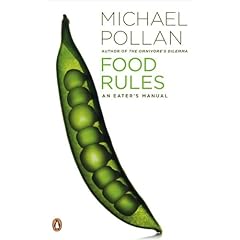I’m sure, if I stretch and twist, I can make this post about Willys, but, frankly, it really has nothing to do with them. So, fair warning….
===========
As I’ve mentioned occasionally in posts, I like cooking and studying food related issues. While I’ve thought about creating a 2nd blog related to these issues, I just haven’t gotten around to it.
About four years ago I asked myself a simple question, for reasons too long winded that I won’t go into them here, exactly what am I supposed to eat? Along the way, I’ve read as many studies, books and articles as I could find that seemed reasonably interested in finding grounded answers, versus sources attempting to champion some superior form of eating. Michael Pollan’s books were some that I felt met those standards (well, until his latest book anyway).
Michael Pollan
 A few years ago, a journalist named Michael Pollan jumped square into the middle of the food discussion with a book called Ominvores Dilemma, which I felt was a very good first attempt at exploring the food system within which American’s operate and the viability of those systems.
A few years ago, a journalist named Michael Pollan jumped square into the middle of the food discussion with a book called Ominvores Dilemma, which I felt was a very good first attempt at exploring the food system within which American’s operate and the viability of those systems.
In his second book on the topic, In Defense of Food, was less memorable, though still an interesting read. This cemented his stature in the “what in the hell should we eat” consciousness of those interested in the topic.
 In his third book, Food Rules, which I read last night, his journalistic senses went rogue (in my opinion), creating a book of food rules that I think, while generally helping most people, are supported by a framework of vegetarianism that undermines the research credibility he gained in his first two books. More to the point, the book ticked me off enough to write a review on Amazon.
In his third book, Food Rules, which I read last night, his journalistic senses went rogue (in my opinion), creating a book of food rules that I think, while generally helping most people, are supported by a framework of vegetarianism that undermines the research credibility he gained in his first two books. More to the point, the book ticked me off enough to write a review on Amazon.
I’ve published my review of the book below because, I suppose, I can; And, maybe, because some of you, maybe one of you, might find it interesting?
====================
My Book Review of Food Rules:
I found this book disappointing. After reading this book, I had to ask myself whether the person who wrote the Ominvore’s Dilemma, which I felt was a well done piece of journalism, was the same person who wrote this book. While Omnivore’s dilemma reflected an earnest attempt at investigation and analysis, this book appears void of many of the lessons learned from that book. While Mr. Pollan notes that much of the ‘science’ for Food Rules comes from In Defense of Food, I can’t say that the conclusions I reached from In Defense were the same as the conclusions Mr. Pollan spells out in this new book (which means I need to re-read In Defense I suppose).
Now, let me note that most of his rules make good sense and will likely help many average Americans improve their health. However, I cannot ignore the glaring faults of this book.
There are two major concerns I have with Food Rules, the initial supposition and the conclusion. The first concern, his definition of a Western Diet, one of two core facts he simply states are generally accepted facts in the world of nutrition, seems more to serve his conclusion (eat lots of vegetables) than to be a real attempt at definition. If we truly don’t understand the problem, how can we develop a rational conclusion? I believe his hypothesis provides zero insight, when in fact it could provide a great deal of insight into the specific problems with most of the food that ‘Westerners’, or more specifically Americans, consume. Based on the studies, literature and lay materials I have read, I see nothing to indicate that his interpretation of the ‘western diet’ is an accurate reflection of any kind of generally accepted wisdom.
The second, and bigger concern I have is Mr. Pollan’s perpetuation, without a shred of discussion, on page 51, of the argument that “Vegetarians are noticeably healthier than carnivores and live longer.” One of the problems with this statement as fact (there are several problems here, but I won’t get into them all) is that most people aren’t carnivores; they are omnivores. For a writer who wrote a book with the word OMNIVORE in the title, I expect him, if anyone, to understand this is not a minor issue.
In fact, this vegetarian vs. carnivore perception exists throughout this book. For example, his rule number 19 states: If it came from a plant eat it; if made at a plant, don’t. To put it bluntly, where’s the beef here? There are problems with the way beef is created! So, I’d change #19 to: If it came from a plant or dined on plants, eat it. If it was made at a plant or grown at a plant (aka CAFO), don’t. The point here is that a large portion of ‘carnivore products’, such as meat and dairy products, that are sold in most stores are nutritionally deficient (in Omnivore’s Dilemma, he made some fantastic points about this) because they are as manufactured as some vegetarian products (processed cereals come to mind).
Moreover, going back to my omnivore point, most people in the US consume nutritionally poor starches (french fries, baked potatoes, etc) or refined foods (burger buns, rolls, etc) along with their poor quality meats which likely undermines some of the potential value of meat/fat consumption. In sum, we have a huge portion of the American population trying to be omnivores, eating a federally encouraged ‘balanced diet’, but, instead, can only consume low quality meats, dairy products, vegetables and refined foods that represent the mainstream foods (in most stores and restaurants) available to most Americans. To classify these people as carnivores misleads people who are truly trying to figure out what they should eat, along with muddling omnivore and carnivore research undeservedly together.
Mr. Pollan can do better and has done better. Hopefully, his next book will be better.

It’s also worth noting that healthy vegetarians may be a sort of chicken and egg situation. Does eating vegetarian make people appear more healthy or did they already eat healthy before becoming vegetarians?
Hey Dr. D,
Nice review. I, being a foodie, have grave reservations with regard to a vegetarian only diet. Just look at the Eskimos. The traditional Eskimo ate primarily fat and blubber. They have had virtually no heart disease at all. The human, it seems to me, is a classic grazer. Eat what you see! I had an angioplasty in 1999, and my heart doctor told me that if I ate a “proper” diet, ie. no eggs, no butter, no meat, etc., that my life expectancy might be two years longer than if I kept up with my regular diet (lots of red meat, very few vegetables, and lots of beer!). I have stayed with my regular diet. These gurus are just writing things with no science behind it at all. Seems with all the global warming hype, CO2 hype, and on and on, that POLITICS is behind most of our science. I am all for our science being behind our politics. Vote all the bastards out. Thanks again for your major efforts with your website. I visit there twice a day. Cheers, Stephen
Unvegan: I think what we’d have to do first is define what it means to be healthy. Defining what it means to be healthy will require a massive de-knotting of incorrect causality assumptions that has lead to our current assumption of health.
For example, some research suggests that higher cholesterol is correlated with heart disease (actually, that’s just for men — the studies for women don’t show the same correlations), but at some point that was turned into causality. An alternative theory, is that cholesterol is activated by cardiovascular disease because cholesterol helps to aide the repair of damaged vessels.
Moreover, some research suggests, especially among women, a correlation between attempts to lower cholesterol and increases in cancer diagnoses. Also, research suggests that women who live longest tend to have high cholesterol. So, we must somehow rationalize these observations (and many others) and studies with the current theories of health and either rethink the initial hypothesis (the lipid hypthesis in particular), dismiss the studies as poorly executed, or dismiss them as outliers.
Stephen: Thanks! FYI: The best history I have yet read on how the US adopted the lipid hypothesis theory (aka cholesterol causes heart disease) as a health paradigm (which is what your Doctor was likely following), is Gary Taubes: Good Calories Bad Calories. It is a 140 year literature and history review of scientific research and, to some degree, the politics surrounding weight loss, heart health, guclose management, the lipid hyphothesis theory, insulin specifics and more. It’s so dense, useful, well argued and well researched that it has become an immensely valuable resource tool for me.
The book I find second most interesting is the 2nd edition of Ron Schmid’s book, The Untold Story of Milk. The 1st edition was good, but the second one was even better, particularly the latter half of the book. It’s a little easier read than Gary’s book, but the focus on a single industry helps contain the topic. The politics of milk are as fascinating and complex as any industry and are a mirror of the policy decisions that must be made to manage across the spectrums of regarding the management of a food supply for massive populations.
For my third and fourth fav books I’d have to reach back several decades to Weston Price’s Nutrition and Physical Degeneration coupled with Francis Pottenger’s book Pottenger’s Cats. For me, these books illustrate that 1) good quality research has been occurring in the field of nutrition for 100 + years; 2) both books clearly demonstrate across large populations the dramatic effects that shifts in nutrition can cause; and 3) both books suggest and consider the multi generational implications of poor diets.